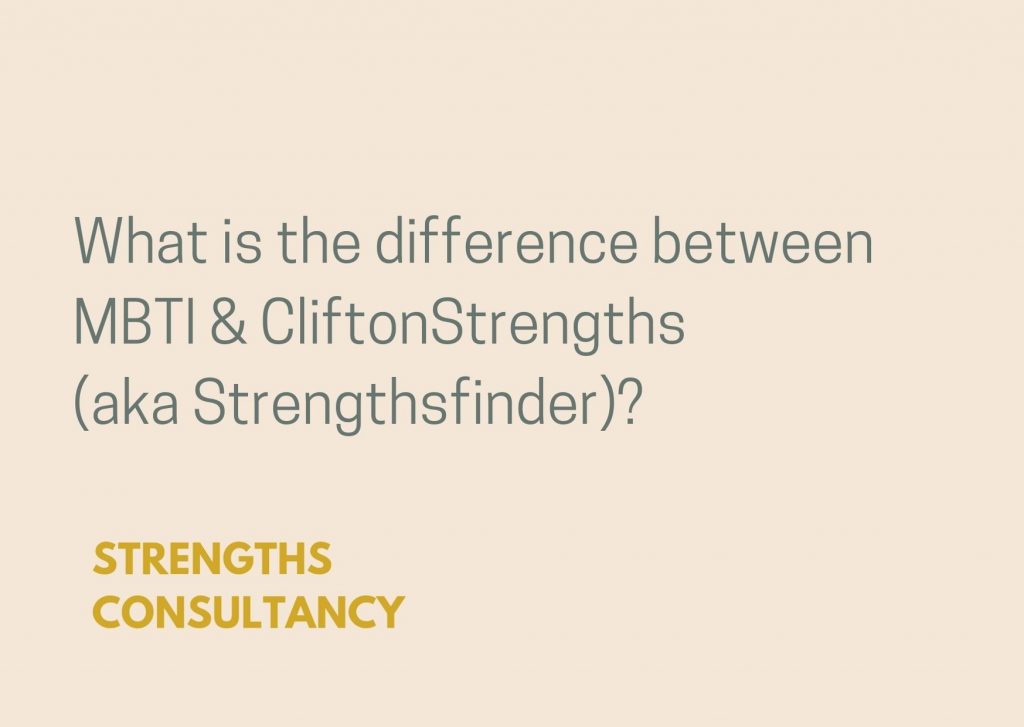What is the difference between MBTI & CliftonStrengths (aka Strengthsfinder)?

We feel the urgent need to answer one of our most Frequently Asked Question: what is the difference between MBTI and CliftonStrengths (aka Strengthsfinder)?
Because there are significant differences between these two development tools. Let’s start!
MBTI (Myers-Briggs)
The MBTI classifications are based on an adaption of Carl Jung’s Theory of conscious psychological type. A series of questions measure distinct polarities of preferences and then groups an individual in one of the 16 possible outcomes.
These distinct polarities of preferences are: Extroversion or Introversion, Sensing or Intuition, Feeling or Thinking, Judging or Perceiving.
“Sensing or Intuition” – determines how you naturally take in information. “Thinking or Feeling” says something about how you evaluate the information you take in. These categories are called: ‘psychological functions’. The first and fourth ‘orientation’ categories indicate how individuals gain energy and focus attention (Introversion or Extroversion) and how they cope with everything in the outside world (Judging or Perceiving).
The resulting four-letter personality type represents the individual’s preference of the two opposites in each category. It defines what personality type you are. In total there are 16 personality types as classification outcomes. This limited amount of possible outcomes might lead to the generalization of people yielding distorted results. Meaning, within a large group of people, it is very likely that you’ll find many individuals with the same personality classification.
CliftonStrengths (aka Strengthsfinder)
The CliftonStrengths finds it’s base in positive psychology and is invented by Don Clifton to empower human development. This performance assessment measures the presence of natural talents in 34 themes. A person answers 177 sets of paired statements and receives several personalized reports with their unique ranking of talents. Personalized? Yes, because there are 278,256 combinations of Top 5 talents possible, and when you also take the ranking into account, chances are 1 into 33 million that someone has the same report with top 5 talents as you have.
CliftonStrengths is an opportunity to discover your talent – it does not define who you are as a personality type, instead it defines your talents & how you can utilize these. It moves beyond surface descriptors of a personality due to the precision afforded by the depth and language of the strengths concepts.
Therefore, Clifton Strengths reveals a more precise approach to one’s uniqueness.
The assessment helps individuals, teams and organization identifying talents that someone demonstrates daily. This gives organizations the opportunity to invest en develop in each of these powerful areas of potential to yield the greatest investment value. Plus, this gives the individual the opportunity to intensely focus on maximizing what he or she naturally does best. When these results are shared within a team, collaboration is boosted together with productivity, profitability and engagement of the team.
So, what should you go for?
Both tests are accurate and provide awareness and using one of this should never be the sole purpose. The choice for MBTI or CliftonStrengths should be made based on the desired outcome.
→ MBTI provides awareness by revealing surface level results about characteristics, yet the link on how this leads to improved performance is missing. This also hurts the empirical validity.
→ The CliftonStrengths assessments not only provides more in depth, personalized and varied results about your talent themes, it also provides context for performance development. And it creates a common language within an organizations to focus on what’s right with people.
CliftonStrengths is more specific and therefore also more complex. It takes more time and effort to understand all the different strengths and their dynamics.
So, if your goal is to boost engagement, (team)performance or profit, it’s better to invest in a strengths-based way of working, versus an understanding of the different personality types present!
Our experience
We’ve taken both tests and worked with lots of people and companies who’ve taken them both. Both tools are a great way to increase awareness, stimulate understanding and appreciation and facilitate dialogue. However, they do differ in depth, precision, approach and what you can actually do with the results to increase performance, happiness, productivity and engagement.
Moreover regarding MBTI, we’ve noticed that for many people the results do not resonate completely, simply because they do not fit into one of the 16 classifications. Let us explain; If one of your dominant talent themes within CliftonStrengths is Communication you will probably be typed as Extravert on MBTI. If you have Intellection as a dominant talent theme, you will be typed as Introvert on MBTI. If a person has both, we tend to hear the MBTI confuses them and doesn’t really resonate, CliftonStrengths, on the other hand, does resonate strongly & provides them with useful information on how to maintain both talents and aim your talents to accomplish your goals.
We are curious – What is your experience with both development tools?